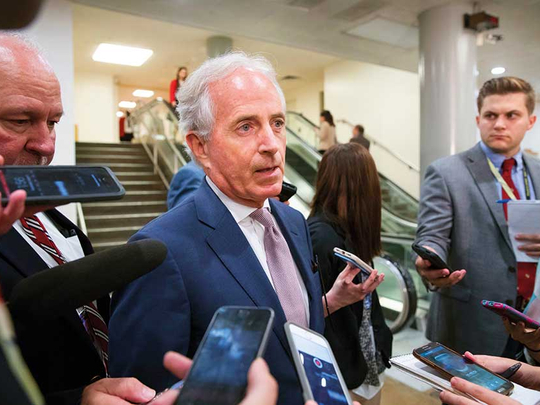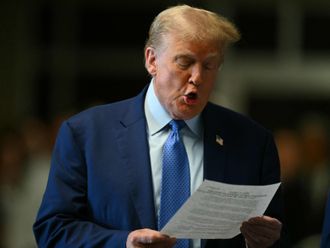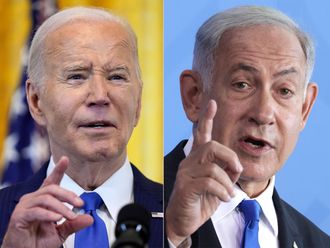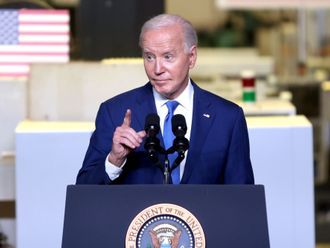
Moscow/Washington: Donald Trump blamed Congress for worsening relations with Russia, which accused the US president of caving in to his legislators by signing a law that could keep sanctions in place for years.
“Our relationship with Russia is at an all-time & very dangerous low,” Trump wrote Thursday on Twitter. “You can thank Congress, the same people that can’t even give us HCare!” he said, referring to the failed effort to overhaul health care.
The Trump administration “has shown its complete weakness” by signing the sanctions law passed by Congress and “relations between Russia and the US are going to be extremely tense,” Russian Prime Minister Dmitry Medvedev wrote on Facebook. The measures are “a declaration of fully-fledged economic war on Russia” that could last for decades, he said.
Taunting the notoriously thin-skinned US president, Medvedev added: “The Trump administration has shown its total weakness by handing over executive power to Congress in the most humiliating way”.
Trump signed the legislation behind closed doors and his reluctance was on full display in an angry signing statement in which he called the legislation “significantly flawed.”
“In its haste to pass this legislation, the Congress included a number of clearly unconstitutional provisions,” he said, including curbs on the president’s ability to “negotiate” with Russia.
“I built a truly great company worth many billions of dollars. That is a big part of the reason I was elected. As president, I can make far better deals with foreign countries than Congress,” Trump claimed.
The legislation — which also includes measures against North Korea and Iran — targets the Russian energy sector, giving Washington the ability to impose sanctions on companies involved in developing Russian pipelines, and placing curbs on some Russian weapons exporters.
The law signed by Trump on Wednesday strengthens punitive measures imposed over Russia’s intervention in Ukraine and meddling in last year’s US presidential election. It also gives Congress the power to block Trump from lifting them. Passage of the legislation ended lingering Russian hopes that the billionaire-turned-politician could deliver on his campaign pledge to work with President Vladimir Putin and turn a page in bilateral relations.
“The hopes have already ended even if there is a residual feeling that Trump, if he was allowed to, would behave differently,” Fyodor Lukyanov, who heads the Council on Foreign and Defence Policy, a Kremlin advisory group, said by phone.
While the relationship with Russia is “pretty low,” the responsibility for that rests with Putin, Republican Senator Tom Cotton said on Thursday on MSNBC. “He’s the one that has invaded countries who are our partners, he’s the one that’s provided missiles that have shot civilian aircraft out of the sky, he’s the one that’s meddled in western democracies to include our own.”
Counter measures
Russia, which has already retaliated by ordering the US to slash staff at its diplomatic mission by almost two-thirds, could take further counter measures, according to the Foreign Ministry.
Putin remained silent on Trump’s decision to sign the law during his visit to Russia’s Far East region on Thursday, while Kremlin spokesman Dmitry Peskov declined to discuss Medvedev’s criticism of the US president during a conference call with reporters.
Russia will try to maintain some cooperation with the US in areas of mutual interest such as Syria, where the two powers agreed last month on a ceasefire near the border with Israel and Jordan, said Andrei Kortunov, head of the Russian International Affairs Council, a Moscow-based research group set up by the Kremlin.
Economic impact
Though the law doesn’t dramatically expand sanctions, the power it gives Congress to block presidential moves to ease them means they’re likely to remain in place for years.
Putin said on state television on Sunday that Russia would refrain from taking further retaliatory steps over the sanctions for now, though “if the time comes, we can consider other options for responding.”
That doesn’t mean the president won’t seek to strike at America in ways that are less directly confrontational, lawmakers said.
“Sometimes you don’t need to announce sanctions, but you can act in such a way that everyone understands without the need for grandstanding,” said Andrei Klimov, deputy head of the foreign affairs committee in Russia’s upper house of parliament.
Russia may penalise US companies working in the country and seek to counter American interests in other parts of the world, according to Oleg Morozov, who also sits on the foreign affairs committee. Even so, the Russian response will be “symbolic” and the Kremlin will try not to burn all its bridges with Trump, he said.
Ultimately, “despite all the euphoria in Moscow after Trump’s election and commentary about Putin as a great strategist, the end result is a more aggressive US sanctions regime doing more damage to Russia,” said Timothy Ash, a senior strategist at Bluebay Asset Management in London.
In a searing rebuttal, maverick Republican Senator John McCain said: “The framers of our constitution made the Congress and the President coequal branches of government. This bill has already proven the wisdom of that choice.”
“I hope the president will be as vocal about Russia’s aggressive behaviour as he was about his concerns with this legislation.”












